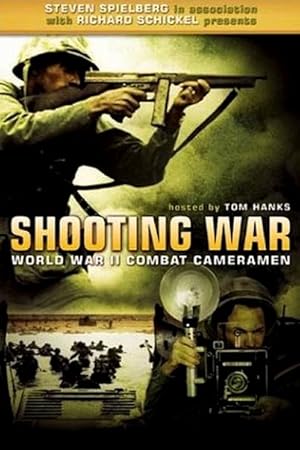
Shooting War Page #5
- Year:
- 2000
- 88 min
- 21 Views
with getting things organised.
Eddie Albert was there.
He was a navy JG at the time.
He was a boat director,
and he discovered early on
that there wasn't much coordination
He stayed on the beach
during the worst part of the fighting
and directed boats bringing supplies in
to carry wounded back to the ships.
As the battle moved inland, the futility
of the naval bombardment was obvious.
Their pounding didn't do much good.
They used armour-piercing shells
and there was no armour.
They were hitting sand
and skittering all over the island.
You'd see these 16-inch shells.
Nothing had ever happened with them.
What grabbed me and took hold of me
was the bodies, the dead bodies,
God knows how many marines,
face down, floating in shallow water.
That was the first time
that I had really seen dead bodies.
When you see these bodies floating
in the water, it grabs you.
And they all seemed to look like
a buddy of mine, Norman Hatch.
This was a piece of ground that wasn't
as big as Central Park in New York,
and in the course of that 72 hours,
6,000 people died.
5,000 of those were Japanese,
1,000 were marines,
and another 2,000 were wounded.
Passing a disabled tank,
Hatch heard this kitten's cry.
He thought it might be a wounded
enemy. It was just another war victim.
He thought he might make a pet of it,
but the kitten scampered away,
never to be seen again.
The quality of his film
earned Hatch a trip home,
where this footage of him was made
for an army-navy short subject.
and every major theatre had my name
on it as taking the Tarawa film.
They were running it.
That's the best combat film
I've ever seen.
- And from an army man to a marine!
- It was just luck.
A movie cameraman,
a stills man... and a driver.
That's how the Signal Corps organised
its combat photographers in Europe.
The cameras we were using
were Eyemo,
called a bomb-spotter camera.
It had a crank on the side you wound up.
They only had one two-inch lens.
If you can believe
the running you have to do
to get your long shot, medium shot
and close-up with a two-inch lens.
It was really criminal
that they sent us there with that stuff.
Yet remarkable things
could be done with that equipment.
John Huston, one of several directors
who followed Ford to war,
used it to make what James Agee
thought the best war documentary.
this strikingly ironic narration.
Patron saint:
Peter.Point of interest: St Peters, 1438.
Note interesting treatment of chancel.
Huston found real war more difficult
Translation
Translate and read this script in other languages:
Select another language:
- - Select -
- 简体中文 (Chinese - Simplified)
- 繁體中文 (Chinese - Traditional)
- Español (Spanish)
- Esperanto (Esperanto)
- 日本語 (Japanese)
- Português (Portuguese)
- Deutsch (German)
- العربية (Arabic)
- Français (French)
- Русский (Russian)
- ಕನ್ನಡ (Kannada)
- 한국어 (Korean)
- עברית (Hebrew)
- Gaeilge (Irish)
- Українська (Ukrainian)
- اردو (Urdu)
- Magyar (Hungarian)
- मानक हिन्दी (Hindi)
- Indonesia (Indonesian)
- Italiano (Italian)
- தமிழ் (Tamil)
- Türkçe (Turkish)
- తెలుగు (Telugu)
- ภาษาไทย (Thai)
- Tiếng Việt (Vietnamese)
- Čeština (Czech)
- Polski (Polish)
- Bahasa Indonesia (Indonesian)
- Românește (Romanian)
- Nederlands (Dutch)
- Ελληνικά (Greek)
- Latinum (Latin)
- Svenska (Swedish)
- Dansk (Danish)
- Suomi (Finnish)
- فارسی (Persian)
- ייִדיש (Yiddish)
- հայերեն (Armenian)
- Norsk (Norwegian)
- English (English)
Citation
Use the citation below to add this screenplay to your bibliography:
Style:MLAChicagoAPA
"Shooting War" Scripts.com. STANDS4 LLC, 2024. Web. 23 May 2024. <https://www.scripts.com/script/shooting_war_18036>.


Discuss this script with the community:
Report Comment
We're doing our best to make sure our content is useful, accurate and safe.
If by any chance you spot an inappropriate comment while navigating through our website please use this form to let us know, and we'll take care of it shortly.
Attachment
You need to be logged in to favorite.
Log In